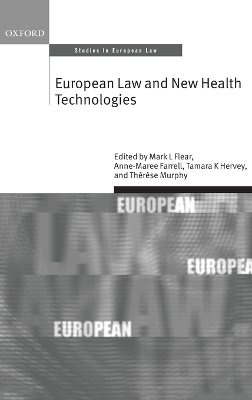
European Law and New Health Technologies
Oxford University Press (Verlag)
978-0-19-965921-0 (ISBN)
Health is a matter of fundamental importance in European societies, both as a human right in itself, and as a factor in a productive workforce and therefore a healthy economy. New health technologies promise improved quality of life for patients suffering from a range of diseases, and the potential for the prevention of incidence of disease in the future. At the same time, new health technologies pose significant challenges for governments, particularly in relation to ensuring the technologies are safe, effective, and provide appropriate value for (public) money.
To guard against the possible dangers arising from new health technologies, and to maximize the benefits, all European governments regulate their development, marketing, and public financing. In addition, several international institutions operating at European level, in particular the European Union, the Council of Europe, and the European Patent Office, have become involved in the regulation of new health technologies. They have done so both through traditional 'command and control' legal measures, and through other regulatory mechanisms, including guidelines, soft law, 'steering' through redistribution of resources, and private or quasi-private regulation.
This collection analyses European law and its relationships with new health technologies. It uses interdisciplinary insights, particularly from law but also drawing on regulation theory, and science and technology studies, to shed new light on some of the key defining features of the relationships and especially the roles of risk, rights, ethics, and markets. The collection explores the way in which European law's engagement with new health technologies is to be legitimized, and discusses the implications for biological or biomedical citizenship.
Mark Flear is a Lecturer in Law at Queen's University of Belfast. He is also a member of the Northern Ireland DNA Database Governance Board. His works include the forthcoming title The Biopolitics of EU Public Health Governance: Cancer, HIV/AIDS and Pandemics. Anne-Maree Farrell is Associate Professor at the Faculty of Law, Monash University, Australia. Her research expertise lies broadly within the area of health law and policy, with a particular interest in the regulatory governance of human biological materials. Recent publications include The Politics of Blood: Ethics Innovation and the Regulation of Risk (2012) and Organ Shortage: Ethics Law and Pragmatism (co-edited with D. Price and M. Quigley, 2011). Tamara Hervey is Jean Monnet Professor of EU Law at the University of Sheffield, UK. Her research and teaching interests are in the field of European Union social and constitutional law, in particular its application in health fields, social security and welfare. She works across disciplines, and considers law in the context of broader modes of regulation. She is interested in socio-legal theory and method, and legal research methodologies in general, in particular as applied to the law of the European Union. Her recent books include Health Law and the European Union (with J McHale, 2004), Health Systems Governance in Europe: The role of EU law and policy (with E Mossialos, G Permanand, and R Baeten, 2010), andResearch Methodologies in EU and International Law (with R Cryer, B Sokhi-Bulley, and A Bohm, 2011). Thérèse Murphy is the Professor of Law and Critical Theory in the Faculty of Social Sciences at the University of ?Nottingham. Her work focuses on human rights law and practice, and her publications include Civil Liberties Law: The Human Rights Act Era (2001), New Technologies and Human Rights (2009), and the forthcoming Health and Human Rights.
PART I: SETTING THE SCENE; PART II: LEGAL APPROACHES TO EUROPEAN LAW AND NEW HEALTH TECHNOLOGIES; PART III: REGULATORY THEORY, REGULATORY INNOVATION, EUROPEAN LAW AND NEW HEALTH TECHNOLOGIES; PART IV: NEW TECHNIQUES FOR RESEARCHING EUROPEAN LAW AND NEW HEALTH TECHNOLOGIES; PART V: BRINGING IT ALL TOGETHER
| Erscheint lt. Verlag | 14.3.2013 |
|---|---|
| Reihe/Serie | Oxford Studies in European Law |
| Verlagsort | Oxford |
| Sprache | englisch |
| Maße | 162 x 240 mm |
| Gewicht | 860 g |
| Themenwelt | Recht / Steuern ► EU / Internationales Recht |
| Recht / Steuern ► Öffentliches Recht | |
| Recht / Steuern ► Privatrecht / Bürgerliches Recht ► Medizinrecht | |
| Sozialwissenschaften ► Politik / Verwaltung ► Europäische / Internationale Politik | |
| ISBN-10 | 0-19-965921-4 / 0199659214 |
| ISBN-13 | 978-0-19-965921-0 / 9780199659210 |
| Zustand | Neuware |
| Haben Sie eine Frage zum Produkt? |
aus dem Bereich


